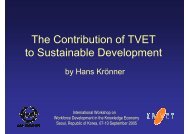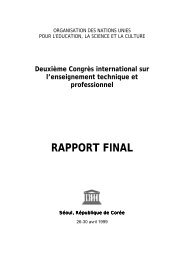Learning for Life, Work and the Future Initial ... - Unesco-Unevoc
Learning for Life, Work and the Future Initial ... - Unesco-Unevoc
Learning for Life, Work and the Future Initial ... - Unesco-Unevoc
You also want an ePaper? Increase the reach of your titles
YUMPU automatically turns print PDFs into web optimized ePapers that Google loves.
<strong>Learning</strong> <strong>for</strong> <strong>Life</strong>, <strong>Work</strong> <strong>and</strong> <strong>the</strong> <strong>Future</strong> Participants’ Papers Page 63<br />
enable <strong>the</strong> school leaver to move directly into <strong>the</strong><br />
world of work, ei<strong>the</strong>r <strong>for</strong>mal or in<strong>for</strong>mal, <strong>and</strong> with little<br />
fur<strong>the</strong>r training to earn a living as a semi-skilled or<br />
skilled worker.<br />
3. Situation at Independence<br />
At independence, most <strong>for</strong>mer colonial countries<br />
demonstrate great enthusiasm <strong>and</strong> commitment to<br />
massive industrialisation <strong>and</strong> commercialisation of <strong>the</strong><br />
economy <strong>and</strong> <strong>the</strong> cherished modernisation of life <strong>for</strong><br />
everybody. A commitment is made to redesign curricula<br />
to ensure that appropriate skills <strong>and</strong> attitudes are<br />
imparted to pupils, who will be able to appreciate <strong>the</strong><br />
role of productive work <strong>and</strong> undertake it. The products<br />
of all educational institutions, in <strong>the</strong> final analysis, are<br />
supposed to be relevant to <strong>the</strong>ir economies as <strong>the</strong>se<br />
trans<strong>for</strong>m. They are supposed not only to be able to<br />
maintain what is <strong>the</strong>re, but to invent <strong>and</strong> discover<br />
appropriate technology which <strong>the</strong> countries’ material<br />
conditions dem<strong>and</strong> from time to time.<br />
However, as time goes on, <strong>the</strong>se high hopes of<br />
matching school curricula with <strong>the</strong> needs of <strong>the</strong><br />
economy are usually dashed. Cosmetic modifications<br />
alone are effected in <strong>the</strong> curriculum, mainly involving<br />
a mere change of names <strong>and</strong> <strong>the</strong> introduction of some<br />
low-level type of practical education that is not likely<br />
to lead to <strong>the</strong> desired trans<strong>for</strong>mation of <strong>the</strong> economy.<br />
In SADC countries a rash of slogans appeared, such as<br />
“Education with Production” in Zimbabwe, “Education<br />
<strong>for</strong> Self Reliance” in Tanzania, <strong>and</strong> “Humanist Education”<br />
in Zambia.<br />
In Zimbabwe, nine Zimbabwe Foundation <strong>for</strong> Education<br />
with Production (ZIMFEP) Schools were set up<br />
at independence, but even in <strong>the</strong>se schools, intended to<br />
spearhead technical/vocational education in <strong>the</strong><br />
country, productive activities were separated from <strong>the</strong><br />
academic curriculum. The latter remained superior <strong>and</strong><br />
continued to follow <strong>the</strong> traditional technical thrust,<br />
dominating all curriculum activity, until <strong>the</strong> so-called<br />
practical subjects were swallowed up <strong>and</strong> again relegated<br />
to second fiddle. Consequently, access to true<br />
technical/vocational education in <strong>the</strong> schools system in<br />
Zimbabwe has become just a dream.<br />
4. Philosophical Backing <strong>for</strong> Academic Education<br />
This continued thrust towards what has come to be<br />
called “academic rationalism” has been abetted by <strong>the</strong><br />
activities of most Examination Boards in <strong>the</strong> <strong>for</strong>mer<br />
colonial countries. To <strong>the</strong>se bodies, localisation means<br />
adopting or adapting <strong>the</strong> aims <strong>and</strong> objectives of <strong>the</strong><br />
<strong>for</strong>mer colonial system toge<strong>the</strong>r with its thinking <strong>and</strong><br />
modus oper<strong>and</strong>i. The change in <strong>the</strong>ir names is, again,<br />
mainly cosmetic. In Anglo-Saxon countries practical<br />
subjects like home economics <strong>and</strong> carpentry have<br />
remained intact, faithful to <strong>the</strong> British tradition in spite<br />
of <strong>the</strong> existence of viable commerce, industry <strong>and</strong><br />
in<strong>for</strong>mal sectors in <strong>the</strong>se countries. The result is that<br />
relevant technical/vocational education is ana<strong>the</strong>ma in<br />
<strong>the</strong> primary <strong>and</strong> secondary school system in most<br />
SADC countries such as Zimbabwe.<br />
Perhaps this strong commitment to <strong>the</strong>ory by secondary<br />
schools, <strong>and</strong> indeed conventional universities,<br />
derives from historical <strong>and</strong> philosophical ideas about<br />
“worthwhile” knowledge inherited from SADC’s<br />
colonial past. Based on <strong>the</strong> Aristotelian dichotomy<br />
between <strong>the</strong>oretical <strong>and</strong> practical knowledge, <strong>the</strong><br />
conviction that <strong>the</strong>ory should be accorded a higher<br />
status than practice persists today in a variety of <strong>for</strong>ms.<br />
The Zimbabwean Experience<br />
The British brought this warped academic paradigm to<br />
<strong>the</strong>ir colonies <strong>and</strong> deliberately made “academic” education<br />
available to <strong>the</strong> colonisers, while “practical”<br />
education was availed to <strong>the</strong> colonised. The work of<br />
Loram in Natal at <strong>the</strong> turn of <strong>the</strong> 20 th century, <strong>and</strong> that<br />
of Kegwin <strong>and</strong> Jowitt in <strong>the</strong> 1920s <strong>and</strong> 1930s, in<br />
setting up low-level craft institutions <strong>for</strong> Africans only,<br />
such as Thsolothso <strong>and</strong> Domboshave in <strong>the</strong> <strong>the</strong>n<br />
Sou<strong>the</strong>rn Rhodesia, is well-known. In Rhodesia, in <strong>the</strong><br />
1960s, this approach was carried into <strong>the</strong> secondary<br />
schools through <strong>the</strong> F(2) system, whose objectives<br />
were to confirm <strong>the</strong> supply of its products into <strong>the</strong><br />
Rhodesian reserves if male, <strong>and</strong> into housewives if<br />
female. Practical subjects were thus limited to growing<br />
vegetables <strong>and</strong> rearing domestic animals such as<br />
chickens <strong>and</strong> rabbits − subsistence activities only.<br />
Access to true technical/vocational education was<br />
reserved <strong>for</strong> <strong>the</strong> whites in institutions such as <strong>the</strong> <strong>the</strong>n<br />
Salisbury Polytechnic <strong>and</strong> Bulawayo Technical<br />
College. The infrastructure in place in <strong>the</strong> various<br />
secondary schools was not put to good use. No wonder<br />
all <strong>the</strong> F(2) schools were converted to academic institutions<br />
soon after independence.<br />
5. Attitudes<br />
The greatest impediment to access to true technical/<br />
vocational education by <strong>the</strong> majority of primary <strong>and</strong><br />
secondary school pupils seems to be <strong>the</strong> attitude of<br />
people involved in education, be <strong>the</strong>y politicians,<br />
managers <strong>and</strong> administrators, practitioners, parents or<br />
<strong>the</strong> pupils <strong>the</strong>mselves. Un<strong>for</strong>tunately <strong>the</strong> decisionmakers<br />
in education, <strong>the</strong> new black elites, <strong>the</strong>mselves<br />
possess an academic education <strong>and</strong> believe that this<br />
type of education is <strong>the</strong> best <strong>for</strong> <strong>the</strong> country. It is <strong>the</strong>re<strong>for</strong>e<br />
underst<strong>and</strong>able that parents should want an<br />
academic education <strong>for</strong> <strong>the</strong>ir children, since it is<br />
erroneously believed to lead to white collar jobs <strong>and</strong><br />
salaried employment <strong>and</strong> <strong>the</strong> consequent ‘good life’ −<br />
a myth that is disproved daily in present-day<br />
Zimbabwe.<br />
The result of this is that politicians <strong>and</strong> education<br />
managers continue to allocate more financial, material





